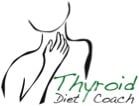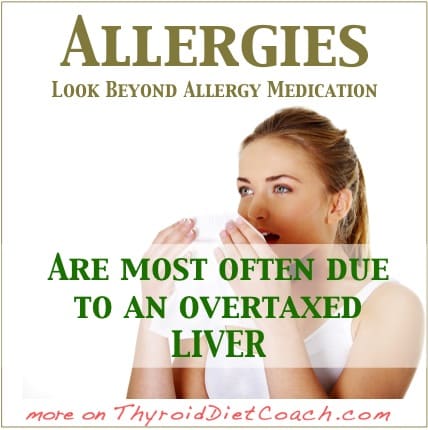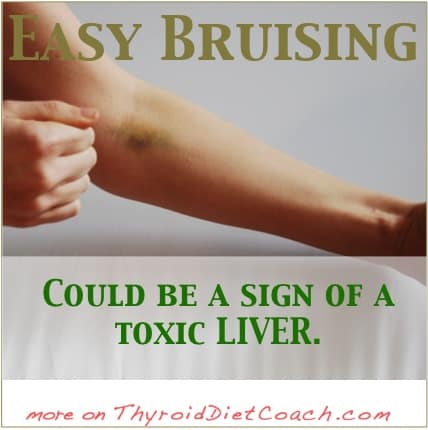How to Identify Liver Problems and Improve Liver Health
This post may contain affiliate links. Read my full disclosure here.
Your Liver Does More Than You Imagined
The liver is responsible for over 200 functions in the body and is the largest internal organ, weighing in at about 55oz (or 1.5 kg). Most people are unaware of how vital it is to good health. Some of the major functions of the liver are:
- Purifying blood (50 oz or 1.4 litres a minute)
- Regulating the metabolism (through bile production)
- Storing minerals and fat soluble vitamins, protein synthesis, glycogen storage and conversion (energy production)
- Cholesterol production (which is a good thing! Cholesterol, contrary to Western medicine’s believes, cholesterol necessary as it is the precursor for our steroid hormones, it manages our brain function, nerve function and hormone transportation)
- Parasite protection (by filtering protazoa) and…
- Detoxification
Where Do Toxins Come From?
According to the EWG (Environmental Working Group), studies show that an average American is daily exposed to 200 chemical toxins and carries as many as 91 of them.
Here are some items that may contribute to our toxic load:
- non-organic food (think: mercury, lead, PCBs and over 130 pesticides)
- air pollution (a long list)
- tap water (think: fluoride, chlorine, PCBs, mercury, lead, parasites)
- skin care products (think: phthalates, BPA, triclosan, parabens)
- house hold cleaning products (think: triclosan, phthalates, parabens)
- medications; both recreational and prescription, including commonly-used ones like corticosteroids, tetracycline and aspirin
- plastics (think: BPA, PFOA)
- cookware like non-stick pans (think: PFOA)
- stress
- alcohol
- coffee
We have several detoxification organs: skin, lungs, kidneys, digestive tract and, of course, the liver. They are all capable of freeing us from these toxins. The challenge is when the load is higher than what they can handle. This is when toxicity takes a toll on us.
What Are the Early Signs of Liver Problems?
Here are some common symptoms which may be related to sluggish liver detoxification and function:
Hormonal imbalance
- Intolerance to HRT (hormone replacement therapy)
- Severe menopausal symptoms
- PMS
- Estrogen Dominance
- Mood Swings
Blood Sugar Problems
- Sugar Cravings
- Hypoglycaemia
- Type 2 Diabetes
- Energy slumps
- Waking in the night
Immune dysfunction
- Allergies/ Skin rashes
- Chemical sensitivities (think: someone who can’t stand fumes or perfumes)
- Chronic Fatigue/Fibromyalgia
- Frequent illness
Nervous System
- Depression
- Anger and irritability
- Foggy brain
- Overheating
- Frequent headaches
Digestive Problems
- Gall stones
- Intolerance to fat
- Sensitivity to alcohol and/or caffeine
- Acid reflux
- Bloating or constipation
- Irritable bowel syndrome
External signs
- Furry tongue
- Bad breath
- Acne and rosacea
- Yellow, red or itchy eyes
- Rashes
- Easy bruising
- Brown spots on hands, back and face
Abnormal metabolism of fats (lipids)
- Abnormal level of fats in the blood, e.g. high LDL (“bad cholesterol”) and reduced HDL (“good cholesterol”)
- Elevated triglycerides
- Blocked arteries leading to hypertension, heart attacks and strokes
- Fatty liver
- Obesity
Would you like to save this?
We commonly hear about cirrhosis (permanent scarring) of the liver and the increase in liver disease in the Western world. We can identify liver damage with the right blood work and by testing for markers like aspartate aminotransferase (AST or SGOT) and alanine aminotransferase (ALT or SGPT). The challenge is that by the time the time these tests are recommended, much of the liver damage has already been done.
It’s key to be educated to prevent damage before it happens. How often do you hear about the common symptoms which are associated with liver fatigue as a result of a toxic or stressful lifestyle? You certainly won’t be hearing about them from your doctor.
How Liver Detoxification Works – Phase One and Phase Two
Most of us know that our liver is responsible for processing alcohol, but the liver is also in charge of detoxifying all waste materials in the body. The liver detoxes waste from our environment (exogenous) and those that are made through everyday bodily processes (endogenous). If the liver is too overburdened to process all the waste, our blood remains high in toxic waste materials and our body is effectively fueled by waste. No wonder we start to feel unwell!
In Phase One of detoxification, called Oxidation, the liver uses oxygen and enzymes to burn toxins. This process makes the toxins more soluble in water so they can be more easily excreted from the body by the kidneys and the liver. Most environmental toxins are fat-soluble to start with, and therefore difficult or impossible to eliminate without the liver’s help. The chemicals produced in Phase One can be more toxic than those which originally entered the body.
Phase One of liver detoxification is inhibited by nutritional deficiency, toxic exposure and medications such as acetaminophen (brand name Tylenol), alcohol consumption, and low protein intake that deplete glutathione, which is needed for acetaminophen detoxification.
To free itself of toxins produced by Phase One detoxification, the liver performs a Phase Two called Conjugation. In Phase Two, oxidized chemicals are combined with sulfur, specific amino acids or organic acids, and then excreted in bile and urine.
Both phases are dependent on vital substances which are required to activate the catalyst for toxin conversion and they must work in balance so that no harmful toxins are left to circulate.
There are six pathways in Phase Two (Conjugation) Detoxification. Each pathway is responsible for converting a different set of substances (e.g. estrogen, thyroid hormones, heavy metals, histamine, phenol, salicylates, biliruben, nicotine, bacterial toxins, caffeine).
The six conjugation pathways are called:
- Amino Acid Conjugation pathway
- The Glutathione pathway
- The Sulphation (sulfation) pathway
- The Methylation pathway
- The Glucoronidation pathway
- The Acetylation pathway
Examples of Liver Detox Pathways
The methylation pathway detoxifies estrogen, dopamine, histamine and heavy metals (methyl groups) and allows them to pass through the liver and out of the body safely. To support this pathway we can increase our intake of choline (avocados/eggs/non-GM soy lecithin) and B vitamins.
The sulphation pathway detoxifies excess neurotransmitters, steroids, thyroid hormones, phenol and excess bile acids. This pathway is often burdened by frequent use of non steroidal anti inflammatory drugs (NSAIDS). We can support this pathway through an increase in high sulphur foods (e.g. egg yolk, broccoli, onion or MSM).
If Phase Two is not working effectively then the highly toxic chemicals formed in Phase One cannot be converted and excreted. This can cause a lot of toxicity issues in the body such as tissue damage or disease. It may also cause excess hormones to circulate through the bloodstream instead of being excreted. This can lead to hormonal imbalances which may affect the thyroid gland or our estrogen levels.
Healing Powers of the Liver and Diet
By detoxifying the body, giving it the right nutritional tools and avoiding nasty environmental toxins (which confuse and hinder the liver), we can literally regenerate this wonderful organ. Your liver’s functions may be restored to full health. Foods and herbs which support liver healing and detoxification can be used to make dramatic changes to symptoms associated with a sluggish liver and give long lasting healing effects.
In the upcoming Thyroid Detox (May 11-22, 2013), we will utilize and help you implement the full Liver Protocol that consists of:
- Foods that support the Phase One and Phase Two detoxification
- Natural sources of amino acids that support Phase Two Detoxification
- Herbs that revive the liver
- Lifestyle changes, like the right sauna, oil packs and lymphatic massage that help open up the pathways.
Once you feel the benefits of a functional and happy liver, you will never want to go back to your old ways. Learn to take advantage of the beauty and power of food and herbs to heal yourself. They are far more potent and safe than countless supplements and magic powders sold in the market.

About the Authors and Thyroid Detox Program
The authors of this article, Magdalena Wszelaki (thyroid nutrition coach) and Josie Lincoln (detox expert), are launching an information-packed video series and a guided Thyroid Detox program for people with thyroid conditions, autoimmune conditions and hormonal imbalance where they continue exploring detox strategies and practical solutions beyond the ones included here.
To listen for FREE to the Thyroid Detox Video Series, go to Thyroid Diet Coach and discover how revitalizing your gut and liver the right way can improve your hormonal balance and make you feel energized, clear-minded, optimistic, inspired to heal further and lose some of that impossible weight.
Editor’s note: I am an affiliate of the Thyroid Detox Program, so should you choose to purchase the program through my website, I do receive an affiliate payment. I think these ladies are doing good work helping people to help themselves. They have many completely free resources on their website in addition to the courses available for purchase.


